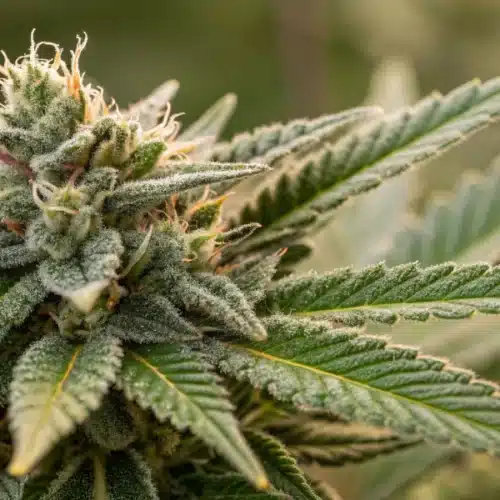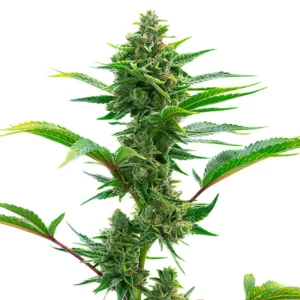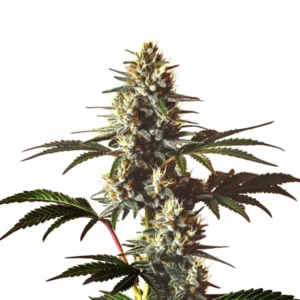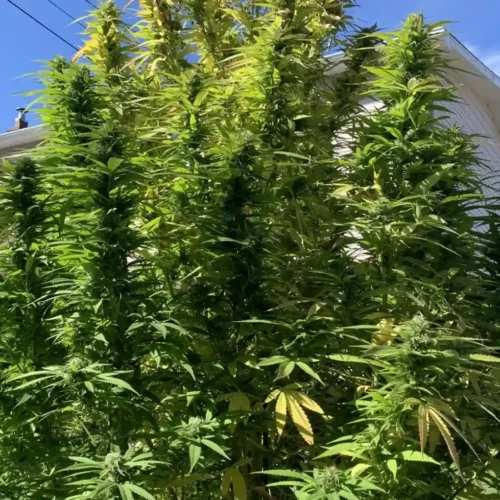Diesel Weed Strain Description
Diesel Strain is a popular cannabis variety known for its powerful effects and rich aroma profile. A favorite among both experienced cultivators and those new to cannabis, it offers an invigorating experience. Diesel’s lineage stems from famous genetics like Mexican Sativa and Chemo, which gives it its Sativa-dominant characteristics in some varieties, while others are more Indica-heavy, like Sour Diesel.
Recommended Strains
Diesel
 THC: 12% - 21%
THC: 12% - 21% Type of seed: Feminized
Type of seed: Feminized Phenotype: Mostly Sativa
Phenotype: Mostly Sativa Day to flower: 9 - 10 weeks
Day to flower: 9 - 10 weeks
When grown correctly, Diesel Weed Strain produces dense, frosty buds that are typically light green with orange pistils. Diesel cannabis strains tend to have a pungent aroma, blending hints of citrus, diesel fuel, and earthy undertones. Among the most aromatic diesel strains weed, this variety stands out for its unique flavor profile and memorable smoking or vaping experience.
The THC levels of this strain typically range from 17% to 23%, providing a powerful yet balanced high. Diesel strains are often praised for their energetic, euphoric effects, making them ideal for daytime use or creative pursuits. The combination of stimulating and relaxing effects makes it a go-to strain for many cannabis enthusiasts.
Promos & Deals
Environmental Requirements for Growing Diesel Weed Strain
Creating the ideal environment for your Diesel Weed Strain plants is essential to ensure healthy growth and maximize yields. Diesel plants thrive in temperate climates with a temperature range of 70-80°F (21-27°C) during the day and cooler nights. Maintaining a stable environment with moderate humidity (50-60%) will help prevent mold or mildew issues.
Indoors, using LED grow lights or HPS lamps is recommended to provide your plants with adequate light intensity. During the vegetative stage, a light cycle of 18-20 hours is necessary for optimal growth. When transitioning to the flowering stage, a 12-hour light cycle should be maintained.
Outdoor cultivation of Diesel strains works best in regions with long, warm summers. These plants require plenty of sunlight and well-draining soil rich in organic matter. Protecting your plants from strong winds and providing support with stakes or trellises is essential, especially during flowering when the buds become dense and heavy.
Setting Up The Growing Cannabis Space
Indoor Cannabis Cultivation
For indoor cultivation, setting up a proper grow space is crucial. Diesel Weed Strain tends to grow tall, especially Sativa-dominant varieties, so make sure your grow tent or room has enough vertical space. A good ventilation system, including an exhaust with a carbon filter, will help manage odors and keep air circulating. Use reflective materials in your grow room to maximize light efficiency and reduce heat buildup.
Choosing the right growing medium is important. Diesel strains do well in both soil and hydroponic systems, but proper drainage is key to prevent root rot. Maintain a pH level of 6.0-6.5 for optimal nutrient absorption. Ensure that your watering and feeding schedules are consistent to support robust growth.
Outdoor Cannabis Cultivation
Outdoor growers should select a location that receives plenty of sunlight throughout the day. Diesel strains can reach impressive heights when grown outdoors, especially Sativa-dominant varieties like NYC Diesel. Be prepared to provide support for the plant’s branches as the flowering phase begins.
Outdoor soil should be well-draining and amended with organic compost or fertilizers to provide the necessary nutrients. Regular pruning of the lower branches will help improve airflow and prevent issues like mold during flowering. A sunny, warm climate is ideal for Diesel Weed Strain, and a greenhouse can be a great option for growers in cooler regions to extend the growing season.

Propagation and Germination of Diesel Weed Strain
Getting the germination process right is vital to ensure a successful grow. Start with high-quality Diesel Weed Strain seeds, ideally feminized to guarantee female plants. Begin by soaking the seeds in distilled water or placing them in a damp paper towel for 24-48 hours until you see taproots emerge.
Once the seeds have germinated, transfer them into small pots with a light and airy soil mix or starter cubes. If you’re growing a strain like Diesel OG, be sure to keep them in a warm, humid environment with indirect light. Maintaining a temperature of 70-80°F (21-27°C) and humidity levels around 60-70% will help ensure the best results.
As the seedlings develop, gradually introduce them to stronger light sources and more airflow to strengthen the plants. When they have developed a few sets of true leaves, they can be transplanted into their final growing space. This strain tends to be vigorous from the start, so ensuring a solid germination phase will set your plants up for success.
Vegetative Phase of Diesel Weed Seeds
The vegetative phase of Diesel Weed Strain is where the plants will develop most of their size and strength. Sativa-dominant Diesel strains can grow quite tall, so managing height is essential, especially if you’re growing sativa indoors. Techniques like low-stress training (LST) or topping can help control vertical growth and encourage more lateral branching, leading to better light penetration and bigger buds.
During this phase, Diesel plants require a nutrient mix high in nitrogen to support strong leaf and stem development. Be sure to monitor the plants closely for any signs of nutrient deficiencies, and adjust your feeding schedule accordingly. Water the plants when the top layer of soil feels dry, and avoid overwatering to prevent root issues.
By maintaining proper lighting, nutrient levels, and airflow, you will set your Diesel plants up for a strong and healthy vegetative phase, preparing them for the upcoming flowering stage.
Flowering Phase of Diesel Weed Strain
The flowering phase is when Diesel Weed Strain begins to develop its signature dense, aromatic buds. To initiate this phase, adjust the light cycle to 12 hours of light and 12 hours of darkness. Diesel plants are known for producing large, resinous buds, but they also need support as the weight of the flowers can cause branches to bend.
Transition your feeding schedule to a bloom-specific nutrient mix with higher phosphorus and potassium content. Keep an eye on the temperature during this phase, aiming for 65-75°F (18-24°C), and maintain humidity levels between 40-50% to prevent bud rot.
Most Diesel strains have a flowering time of 8-10 weeks, though some, like NYC Diesel, may take up to 12 weeks. Monitoring trichome development with a magnifying tool will help you identify the optimal harvest window.
Cannabis Fertilization and Nutrition
Proper fertilization is key to growing strong Diesel Weed Strain plants. During the vegetative phase, Diesel strains thrive with nutrient formulas high in nitrogen, but during the flowering phase, phosphorus and potassium become more important for bud development.
It’s important to feed your Diesel plants according to a schedule, starting with lower concentrations of nutrients and gradually increasing as the plants grow. Be cautious of nutrient burn, which can manifest as yellowing leaves or burnt tips. Always ensure your plants receive clean water, and consider flushing them with pure water during the last week of the flowering phase to remove any residual nutrients before harvest.
Pest And Disease Control for Cannabis Growing
Although Diesel Weed Strain is known for being a robust plant, it is still susceptible to pests and diseases like spider mites, aphids, and mold. Prevention is the best strategy, so keep your grow space clean and well-ventilated. Regularly inspect your plants for signs of infestation or disease.
For organic pest control, introduce beneficial insects such as ladybugs or predatory mites. If you do encounter pests, organic sprays like neem oil or insecticidal soap can be effective. Ensure that you follow the recommended dosages and avoid applying treatments during the flowering phase to maintain bud quality.
Harvesting and Curing for Cannabis Growing
Harvesting your this strain at the right time is essential for preserving its potency and flavor. Look for trichomes that have turned cloudy with a few amber ones, indicating that the THC content is at its peak.
After harvesting, hang the branches upside down in a dark room with good airflow. The drying process usually takes 7-14 days. Once the buds feel dry to the touch, place them in airtight glass jars for curing. Open the jars daily during the first week to allow moisture to escape, then gradually reduce the frequency over the following weeks. Proper curing enhances the flavors and smoothness of your buds.

Is Diesel Strain Indica or Sativa?
Diesel Weed Strain can be either Sativa or Indica dominant, depending on the variety. Sour Diesel and NYC Diesel are more Sativa-dominant, providing an energetic and uplifting effect, while some hybrids like Diesel Kush are Indica-dominant, offering more body relaxation.
This versatility is part of Diesel’s appeal, as it caters to different preferences. Whether you’re looking for a strain to boost creativity or one to help you relax after a long day, this strain has something for everyone. The cerebral effects typical of Sativa-dominant strains make it a popular choice for daytime use, while Indica-dominant variants can be great for winding down in the evening.
Advantages of Growing Diesel Weed Strain
Growing Diesel Weed Strain comes with several benefits that make it a favored option among cannabis cultivators:
- Resilient and robust growth, making it suitable for various environments.
- Produces high yields of dense, aromatic buds.
- Offers a unique and powerful flavor profile, combining citrus, diesel, and earthy tones.
- Adaptable to both indoor and outdoor cultivation.
- High THC content (up to 23%) provides a potent effect.
- Can deliver both energizing and relaxing effects, depending on the strain.
Disadvantages of Growing Diesel Weed Seeds
While Diesel Weed Strain has many advantages, it’s important to be aware of potential challenges:
- Sativa-dominant varieties can grow tall, which may require height management indoors.
- Longer flowering periods for some strains, such as NYC Diesel, which can extend up to 12 weeks.
- Diesel’s pungent aroma may require odor control measures, especially for indoor grows.
- Branches can become heavy during flowering and may need support.
Why Buy Diesel Weed Strain
Diesel Weed Strain is an excellent choice for both novice and experienced growers. It offers a dynamic range of effects, from energizing and creative to relaxing and soothing, depending on the specific strain.
With its signature diesel aroma and high THC levels, this strain has gained a strong following in the cannabis community. The strain is known for producing high-quality buds that offer a memorable smoking experience. Additionally, Diesel is versatile and can be grown in various environments, making it accessible to a wide range of cultivators.
When purchasing this seeds, make sure to buy from reputable seed banks to ensure the authenticity of the genetics. Feminized seeds are often recommended to avoid the hassle of identifying and removing male plants during the growing process.
Similar Strains to Diesel Weed Seeds
For those who enjoy this strain, here are three other strains that offer similar effects and growing characteristics:
Sour Diesel: is one of the most famous strains in the cannabis world, known for its uplifting and energizing effects. It shares a similar flavor profile to this strain with strong notes of citrus and fuel. Sour Diesel is Sativa-dominant and provides a cerebral high, making it a great daytime strain.
NYC Diesel: offers a similar experience to Sour Diesel but with a sweeter and fruitier flavor. This Sativa-dominant strain is perfect for boosting energy and creativity. Its long flowering period is balanced by the large yields it produces, making it a rewarding strain for experienced growers.
OG Kush: is another popular strain with a potent diesel aroma. While it is more Indica-dominant, it shares some characteristics with Diesel Weed Strain, particularly in its pungent flavor and relaxing effects. OG Kush is well-known for its ability to ease stress and provide full-body relaxation.
Tips for Professional Growers
Professional growers looking to maximize their yields and produce top-quality Diesel Weed Strain should consider the following tips:
Optimize Nutrient Schedule: Professionals should use a precise nutrient schedule tailored to the specific needs of Diesel strains. Diesel plants benefit from higher nitrogen during the vegetative phase and increased phosphorus and potassium during flowering. Maintaining a balanced feeding regimen ensures healthy plants and abundant yields.
Advanced Training Techniques: For Sativa-dominant Diesel strains, using advanced training techniques like Screen of Green (ScrOG) or Low-Stress Training (LST) can help control height and improve bud development. These methods allow better light distribution, resulting in larger and more resinous buds.
Climate Control: Diesel strains thrive in stable environments, so professionals should invest in high-quality climate control systems. Monitoring temperature and humidity closely during flowering is critical to prevent mold and enhance resin production.
FAQs about Growing Diesel Weed Strain
How long does Diesel Weed Strain take to flower?
The flowering time for this strain typically ranges from 8-10 weeks, though some varieties, like NYC Diesel, may take up to 12 weeks.
What is the ideal climate for growing Diesel Weed Strain?
Diesel Weed Strain thrives in temperate climates with plenty of sunlight. Indoor growers should maintain temperatures between 70-80°F and humidity around 50-60% for the best results.
What are the effects of Diesel Weed Strain?
This strain is known for its balanced effects, offering both cerebral stimulation and body relaxation. Depending on the strain, you may experience an energetic, euphoric high or a more calming effect.
Can I grow Diesel Weed Strain indoors?
Yes, this strain can be grown indoors. Ensure you have enough vertical space for Sativa-dominant varieties, as they can grow quite tall. Training techniques like LST can help manage height.
What flavors can I expect from Diesel Weed Strain?
This strain is known for its strong diesel fuel aroma, accompanied by citrus and earthy flavors. Some varieties may also have fruity or sweet undertones.

















